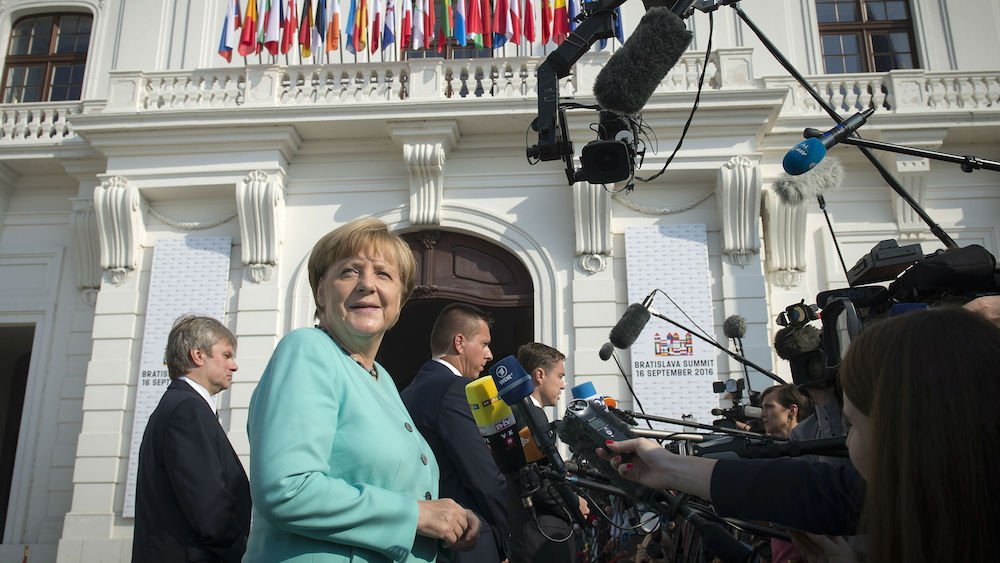Recent successes by the rightwing, anti-foreigner Alternative für Deutschland are putting the German chancellor on the spot. Should her European colleagues fail to help her out, they may facilitate her political downfall.
A chastened Chancellor Angela Merkel made her way to Bratislava for Friday’s EU summit. The days of riding high are over. Her Christian Democratic Union (CDU) is down almost 10 points on its last federal election showing, exactly a year before the next.
Two weeks ago, the CDU suffered the latest humiliating defeat in Merkel’s eastern political homeland, finishing third behind the far-right Alternative für Deutschland (AfD) in a regional poll. On Sunday another CDU drubbing looms in Berlin’s city-state elections.
Pollsters attribute the slump almost exclusively to a fateful Merkel’s decision a year ago. On September 4, 2015, she set aside EU rules for 20,000 Syrian asylum seekers who set out on foot from Budapest to Austria and Germany. It was a leap of faith for Merkel, completely out of character for a woman who has patented a unique brand of pedantic pragmatism.
A year on, Germans are still arguing over whether it catalyzed an already growing migration wave across the continent. Was the chancellor’s “lone decision” (actually, she consulted her Social Democratic coalition partner in hasty phone calls) an outpouring of heart-rending humanity toward Syrians stuck in Hungary, or a display of narcissistic naiveté?
Did scores of German volunteers give the exhausted arrivals a hearty welcome because they were anxious to finally do something for the poor people of war-torn Syria? Or were they, subconsciously, trying to convince their European neighbors and themselves that they were not the heartless monsters as they had so often been portrayed, most recently in the euro crisis? When the refugees trapped in Budapest chanted “Germany, Germany,” did they perceive it as a superpower or a soft touch ?
Many questions and few answers. Though numbers have slowed considerably now, still about 300,000 people have filed for asylum in Germany so far this year. The welcome has cooled rapidly since the New Year’s Eve sexual assaults of women in Cologne. July brought two attacks inspired by the so-called Islamic State (IS) which ended with the death of the perpetrators – both refugees – but caused no fatalities. (A US-style mass shooting perpetrated by a German-born schoolboy of Iranian descent in a shopping mall left nine people dead.) This week saw German special forces raid a suspected IS sleeper cell in northern Germany and neo-Nazi riots in the eastern city of Bautzen.
An increasingly isolated Merkel warns against linking Islamist violence directly to the refugee crisis. But many voters are doing just that and drifting to the far-right, anti-immigration AfD. At first the three-year-old party appealed to old-fashioned racists and neo-Nazis, but now it is pulling in support from all parties and from non-voters.
Many of these feel aggrieved that Merkel personally threw open Germany’s doors to an “uncontrolled” migration wave – asylum seekers but also economic migrants – without asking them. A related narrative has established itself in the media: that Germany’s refugee policy – like much of government policy in Berlin these days – is less about weighing up the national interest than about Merkel making lone, tactical decisions.
In a country that is culturally obsessed with plans, order, and control, a statistically irrelevant number of violent asylum seekers have made a statistically relevant number of people feel their chancellor is powerless and has no plan. These increasingly anxious people believe Germany – along with Austria, Sweden, Italy, and Greece – has been left holding the millions of migrants (and the associated risks), while the rest of the EU is washing its hands of it.
EU leaders have a lot to discuss – above all Brexit. But the refugee issue hasn’t gone away. After failing to secure a burden-sharing deal with other capitals, Merkel pushed a controversial plan B: the refugee swap deal with Turkey. If that fails, the onus returns to EU leaders to reconsider burden-sharing that allows Merkel to save face with her voters.
If no deal is reached, and Germany is then hit by a major Islamist attack, Europe’s refugee crisis hand-sitters can congratulate themselves. They will have assisted Germany’s lurch to the hard right – and the fall of Angela Merkel.







